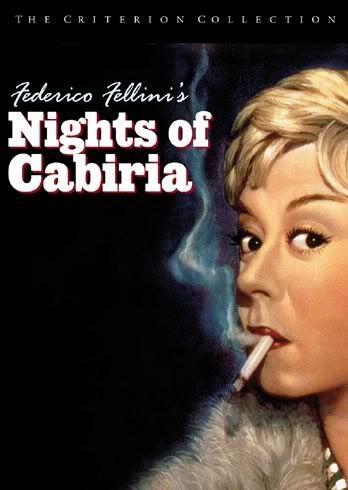Nights of Cabiria (Wikipedia)
Nights of Cabiria (Italian: Le notti di Cabiria) is a 1957 Italian romantic drama film directed by Federico Fellini and starring Giulietta Masina, François Périer, and Amedeo Nazzari. Based on a story by Fellini, the film is about a waifish prostitute who wanders the streets of Rome looking for true love but finds only heartbreak. In 1998 the film was rereleased, newly restored and with a crucial scene that censors had cut.
The name Cabiria is borrowed from the 1914 Italian film Cabiria, while the character of Cabiria herself is taken from a brief scene in Fellini's earlier film 'The White Sheik'. It was Masina's performance in that earlier film that inspired Fellini to make this film. But no one in Italy was willing to finance a film which featured prostitutes as heroines. Finally, Dino de Laurentiis agreed to put up the money. Fellini based some of the characters on a real prostitute whom he had met while filming 'Il Bidone'. For authenticity, he had Pier Paolo Pasolini, known for his familiarity with Rome's criminal underworld, help with the dialogue.
The American musical and movie Sweet Charity is based on Fellini's screenplay.
When I started watching this movie, I had no idea as to what to expect. The movie revolves around "Cabiria," who was a prostitute--although this is downplayed in certain ways and just not really presented that way, as she often hung out with normal 20ish people--who lived in a house in a downtrodden district in or on the edge of Rome. She is a very engaging character who always wears her emotions on her sleeve. I can't really describe the character, who was almost like Sandra Dee meets Gwen Stefani with a little Audrey Tautou thrown in... and loud!! Bad things always seemed to happen to her, but she was never down for very long before some experience would make her smile or dance. You don't want anything really bad to happen to her, and you want her to get her life together, but it always does. At the end, something really horrible happens to her where she doesn't want to go on; but then shortly later she is smiling, and the theme seems to be "life is worth living" no matter what happens. The movie always keeps your attention. There's never a dull moment with the bantam Cabiria.
I don't watch a whole lot of movies now, but when I do, I always look it up and cross-reference names, dates, places, etc. This movie was no exception. There are some interesting tie-ins with all of that here. Old movies are like a time capsule. I mean, it's not like this was a hundred years ago... it was from the late fifties; in some ways a long time, and in other ways not very long. However, in this movie they all seem to have passed away. I see more of a deeper meaning in older Italian or European movies, rather than those from Hollywood...which is almost like a political or social engineering machine now. There's a certain innocence to older Italian cinema, generally a certain honesty. There's a movie poster on the above link, and a few images and posters from the movie here.
"Spoiler Alert" beyond this point!
Plot
The film opens with Cabiria happy and laughing, on a river bank with her current boyfriend and live-in lover. He pushes her into the river and steals her purse which is full of money. She cannot swim and very nearly drowns, but is rescued and revived at the last possible moment by helpful ordinary people who live a little further down the river.
The rest of the plot follows Cabiria as she plies her trade, interacts with her best friend and neighbor Wanda, and searches for a chance to better her life. She is frequently mistreated and taken advantage of, but she has some interesting adventures, and manages to keep her basic attitude to life positive.
Eventually, she meets Oscar, an accountant, who seems genuinely kind and who promises her a happy future. At first she is cautious and suspicious, but after several meetings she falls passionately in love with him and they are to be married—after only a few weeks. However, during a walk in a wooded area, on a cliff overlooking a lake Oscar becomes distant and starts acting nervous. Cabiria realizes that—just like her earlier lover—Oscar intends to push her over the cliff and steal her money (she sold her house and possessions and keeps all the money in her purse). She throws her purse at his feet, sobbing in convulsions on the ground as he abandons her.
She later picks herself up and stumbles out of the wood in tears. In the film's famous last sequence, Cabiria walks the long road back to town when she is met by a group of young people riding scooters, playing music, and dancing. They happily form an impromptu parade around her until she begins to smile through her tears.
.


No comments:
Post a Comment